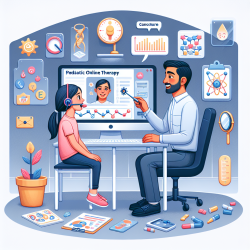As a passionate advocate for data-driven decision-making in speech language pathology, I am always on the lookout for research that can help practitioners improve their skills and create better outcomes for children. The recent 2023 ACMT Annual Scientific Meeting in San Diego, CA, presented several research findings that can significantly impact pediatric therapy, particularly in the realm of online therapy services provided by companies like TinyEYE. This blog will delve into key research outcomes and discuss how practitioners can implement these findings or be encouraged to pursue further research.
Postpartum Maternal Opioid Therapy and Neonatal Outcomes
One of the critical studies presented at the meeting was by Jonathan Zipursky et al., which examined the association between postpartum maternal opioid therapy and adverse neonatal outcomes. This population-based retrospective cohort study used data from Ontario, Canada, involving 85,675 women who filled an opioid prescription within seven days of hospital discharge after delivery. The study found no significant increase in neonatal hospitalization or other adverse outcomes among children of mothers who filled an opioid prescription compared to those who did not.
Implications for Practitioners: This study provides reassurance that postpartum opioid therapy, when appropriately managed, does not pose a significant risk to neonatal health. Practitioners can use this information to guide discussions with postpartum mothers about pain management options, emphasizing the importance of adherence to prescribed dosages and monitoring.
Lead Exposure and Estrogen Levels in Women
Another notable study by Anna Gerald et al. explored the relationship between blood lead levels (BLLs) and serum estrogen levels in adult women. The cross-sectional study found a statistically significant inverse association between BLLs and estrogen levels, particularly among women aged 50-80 years. This finding suggests that lead exposure may contribute to decreased estrogen levels and earlier onset of menopause.
Implications for Practitioners: For pediatric therapists, this study highlights the importance of considering environmental factors like lead exposure that could indirectly affect children through maternal health. Practitioners should advocate for lead screening and interventions to reduce exposure in communities.
Pediatric Poisonings and Risk of Mortality
Rachel E. Culbreth and colleagues presented research on the Pediatric Risk of Mortality-III (PRISM III) and Pediatric Index of Mortality (PIM3) scores among pediatric poisonings. The study demonstrated that higher PRISM III and PIM3 scores are predictive of higher mortality and longer lengths of stay (LOS) in pediatric intensive care units (PICUs), except for stimulant poisonings.
Implications for Practitioners: This research underscores the need for accurate risk assessment tools in managing pediatric poisonings. Practitioners can use PRISM III and PIM3 scores to identify high-risk patients early and allocate resources more effectively to improve outcomes.
Using Web Monitoring to Predict Medication Misuse Trends
Hannah S. St. Francis et al. conducted a study comparing the RADARS® Web Monitoring Program and the National Poison Data System (NPDS) data to predict trends in medication misuse, such as the "Benadryl Challenge." The study found that web monitoring could identify significant spikes in internet mentions of medication misuse trends, which preceded increases in reported ingestions to poison centers.
Implications for Practitioners: Web monitoring can serve as an early warning system for emerging trends in medication misuse. Speech language pathologists and other pediatric therapists can collaborate with schools and parents to provide timely education and interventions based on these trends.
MT Consultation and Outcomes for Poisoned PICU Patients
Kim Aldy et al. examined the impact of medical toxicologist (MT) consultations on outcomes for poisoned PICU patients. The study found that MT consultations were associated with a 66% lower odds of mortality and an 18% shorter PICU LOS compared to patients without MT access.
Implications for Practitioners: This study highlights the value of specialized consultations in improving outcomes for poisoned pediatric patients. Online therapy services like TinyEYE can consider integrating toxicology experts into their consultation networks to provide comprehensive care for children with complex needs.
Conclusion
The research presented at the 2023 ACMT Annual Scientific Meeting provides valuable insights that can help practitioners improve pediatric therapy outcomes. By implementing these findings and staying informed about emerging trends, practitioners can enhance their skills and contribute to better health and well-being for children.
To read the original research paper, please follow this link: 2023 ACMT Annual Scientific Meeting Abstracts – San Diego, CA.










